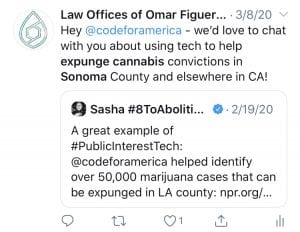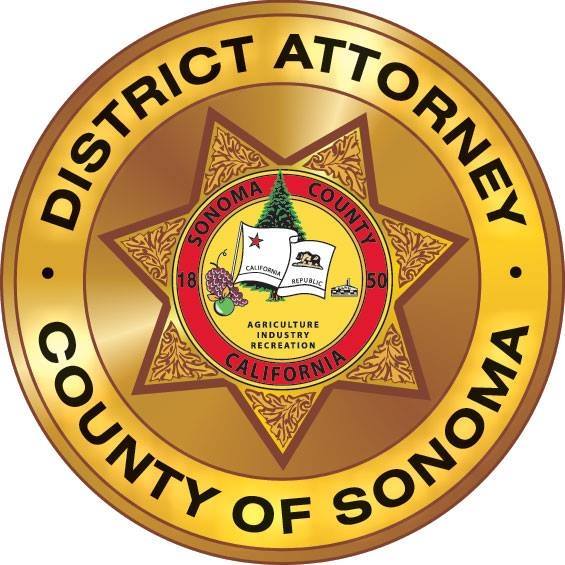Sonoma County District Attorney Jill Ravitch Waits Until Right Before Deadline to Comply with Law Regarding Cannabis Convictions
July 2, 2020
by Omar Figueroa
On June 26, 2020, Sonoma County District Attorney Jill Ravitch announced via press release that “2735 Sonoma County marijuana convictions will be dismissed as part of a program initiated by her office with the assistance of the ‘Clear My Record’ application, a state-wide software application that allows District Attorneys to securely and accurately evaluate eligibility for Proposition 64 relief by reading and interpreting criminal history data from the California Department of Justice.”
Although the announcement stated that the convictions “will be dismissed”, it did not specify when in the future those dismissals would occur. Apparently, the dismissals had not yet taken place, for otherwise the press release would have made clear that the convictions “have been dismissed.” The press release fails to specify how many of those cannabis convictions were prosecuted since 2011, when current District Attorney Jill Ravitch took office.
The Sonoma County District Attorney’s announcement also fails to mention Assembly Bill 1793, which imposed a deadline of July 1, 2020 for prosecutors across California to review cannabis convictions within their jurisdiction.
Indeed, cannabis activists have for years implored Sonoma County District Attorney Jill Ravitch to expunge cannabis convictions, yet she initially refused to take any proactive steps to do so. See, for example, Close to Home: Why Won’t DA Jill Ravitch Expunge Marijuana Convictions? by Erich Pearson, published on February 11, 2018 in Sonoma County’s local newspaper of record, the Press Democrat. Similarly, our office took several steps to prod the Sonoma County District Attorney’s Office along: we participated in phone calls with the District Attorney ; sent a request pursuant to the California Public Records Act (CPRA) to ascertain what progress had been made with the previously announced Policy Regarding Dismissal of Cannabis-Related Criminal Convictions; and even reached out directly to Code for America (creator of the “Clear My Record” application) and the District Attorney’s Office to speed up the process.

By comparison, prosecutors in other jurisdictions across the state have been far more proactive in clearing cannabis convictions. For example, as recently noted by Ellen Komp of California NORML in Clearing of Past Marijuana Crimes Moves Forward Across California:
Even before the state law took effect, SF District Attorney George Gascon announced in February 2019 he would release over 9,000 past marijuana convictions for resentencing or expungement. After Gascon challenged Los Angeles DA Jackie Lacey for re-election, she announced LA will move to expunge 66,000 past convictions.
In Santa Clara County, a judge has already signed off on more than 13,000 marijuana convictions, affecting more than 9,000 people, well more than the 3,068 cases released by DOJ.
Similarly, in Mendocino County, District Attorney David Eyster announced in early January that the required reviews of cannabis convictions had been completed and that written AB 1793 motions with supporting spreadsheets had been filed affecting a total of 3,311 cases. Notably, Mendocino County fast-tracked the process and completed its review in half of the time allotted by law:
The criminal records database information developed by the Department of Justice was provided to the local district attorneys on or about July 1, 2019. Without additional monies to fund the effort, each district attorney was required on or before July 1, 2020, to review each local marijuana conviction to decide on an individualized case and defendant basis whether a prior marijuana conviction was eligible for expungement, some kind of revision, or reduction. AB 1793 does not require that the person with a prior marijuana conviction be contacted for input and/or consent or, for that matter, that he or she even still be alive. Locally, while understanding that he had a full year to review all of Mendocino County’s marijuana convictions pursuant to AB 1793, District Attorney Eyster put his local analysis on a fast track, using to his advantage his own in-house data management system, a system known as Justware. In half the time allotted by law (from July 1, 2019 through December 26, 2019), the DA and his staff completed their multi-year review of all marijuana convictions entered in the Mendocino County courts from 1973 to present.
In Humboldt County, the District Attorney’s Office announced far-reaching record clearances, including addressing the issue of criminal defendants who were accused of cannabis-related felonies and almost always ended up pleading to a non-cannabis “wobbler” which would not technically be eligible for relief under AB 1793:
AB 1793 addressed cannabis-related violations of the Health and Safety Code sections covering possession (section 11357), cultivation (section 11358), possession for sale (section 11359) and transportation (section 11360). AB 1793 required that the California Department of Justice provide prosecutors’ offices throughout the state with lists of their relevant cases. When the list provided to Humboldt County included only 35 cases, District Attorney Maggie Fleming directed her staff to conduct their own search. Historically in Humboldt County, some people charged with Health and Safety Code sections 11357-11360 requested and were granted the opportunity to plead guilty to Health and Safety Code 11366.5 (managing a location for unlawful use or storage of a controlled substance), because that conviction could be reduced to a misdemeanor upon successful completion of probation. Therefore, the District Attorney’s Office also included violations of that code section in its search. Humboldt County’s search, which dated back as far as possible given available computer records, yielded about 3500 violations across more than 800 separate cases. While some violations of Health and Safety Code 11366.5 were not eligible for re-designation because they involved methamphetamine or heroin, all violations of 11366.5 involving cannabis and all convictions for violations listed in AB 1793 were reduced from felonies to misdemeanors.
The Humboldt County approach ought to be considered at the state level: it makes sense to reduce all violations of Health and Safety Code § 11366.5 involving cannabis from felonies to misdemeanors. Same for Health and Safety Code § 11366, as that was another popular “wobbler” for plea bargains.
Until further legal reforms are enacted, cannabis defendants convicted of 11366 and 11366.5 “wobblers” may have to go to court to petition for post-conviction relief, such as misdemeanor reduction pursuant to Penal Code § 17(b)(3) and dismissal pursuant to Penal Code § 1203.4. This process, which ordinarily requires a court appearance, makes it more difficult for those without the means to hire private counsel, as noted in a Washington Post article (Convicted of a marijuana crime in California? It might go away thanks to legal pot) published in 2017:
Omar Figueroa, a defense lawyer in Sebastopol, Calif., who specializes in marijuana law, said the requirement to go to court makes it more difficult for the poor to take advantage.
“That’s one of the criticisms, that a lot of people don’t have the time or energy or the access to public transportation to get to the courthouse,” Figueroa said. “What I see is the people who have more means are the ones who are taking advantage of this, and the people who have more basic struggles in their everyday life, the last thing they’re thinking about is cleaning up their criminal history for their old marijuana convictions.”
As the record-clearing experience in Humboldt County shows, Assembly Bill 1793 was an excellent start, but it did not capture all cannabis-related convictions, and more work remains to be done in freeing victims of the War on Drugs.
We will continue to advocated for automated record clearance for cannabis convictions to streamline the process, even though it may be against our financial interests as lawyers who would otherwise get paid for this post-conviction legal work. Why? Because it’s the right thing to do. Cannabis should never have been prohibited in the first place, and we remain committed to cannabis freedom.
This information is provided as a public educational service and is not intended as legal advice. For specific questions regarding cannabis record clearance or other topics related to post-conviction relief for cannabis-related convictions, please contact the Law Offices of Omar Figueroa at info@omarfigueroa.com or 707-829-0215 to schedule a confidential legal consultation.

